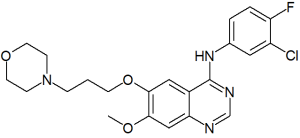Iressa
Gefitinib is a new drug used in the treatment of certain types of cancer. Acting in a similar manner to erlotinib (marketed as Tarceva), gefitinib selectively targets the mutant proteins in malignant cells. It is marketed by AstraZeneca under the trade name Iressa®. more...
Mechanism of action
Gefitinib is the first selective inhibitor of epidermal growth factor receptor (EGFR) tyrosine kinase. The target protein (tyrosine kinase) is also sometimes referred to as Her1 or ErbB-1 depending on the literature source.
EGFR is overexpressed in the cells of certain types of human carcinomas - for example in lung and breast cancers. This leads to inappropriate activation of the apoptotic Ras signal transduction cascade, eventually leading to uncontrolled cell proliferation. Research on gefitinib-sensitive non-small cell lung cancers has shown that a mutation in the EGFR tyrosine kinase domain is responsible for activating anti-apoptotic pathways (Pao et al. 2004, Sordella et al. 2004). These mutations tend to confer increased sensitivity to tyrosine kinase inhibitors such as gefitinib and erlotinib. Of the types of non-small cell lung cancer histologies, adenocarcinoma is the type that most often harbors these mutations. These mutations are more commonly seen in Asians, women, and non-smokers (who also tend to more often have adenocarcinoma).
Gefitinib inhibits EGFR tyrosine kinase by binding to the adenosine triphosphate (ATP)-binding site of the enzyme. Thus the function of the EGFR tyrosine kinase in activating the Ras signal transduction cascade is inhibited, and malignant cells are inhibited.
Clinical uses
Gefitinib is currently only indicated for the treatment of locally advanced or metastatic non-small cell lung cancer (NSCLC) in patients who have previously received chemotherapy.
While gefitinib has yet to be proven to be effective in other cancers, there is certainly potential for its use in the treatment of other cancers where EGFR overexpression is involved.
In 2004, AstraZeneca informed the United States Food and Drug Administration (FDA) that a large randomized study failed to demonstrate a survival advantage for gefitinib in the treatment of non-small cell lung cancer (NSCLC). Whether progression-free survival is prolonged is not clear from this statement. AstraZeneca also withdrew their application to market gefitinib in Europe shortly after this announcement.
Erlotinib is another EGFR tyrosine kinase inhibitor that works in the same way as gefitinib. Given the lack of survival advantage for gefitinib and the positive results for erlotinib, erlotinib has replaced gefitinib in the United States.
Genzyme test
On September 26 2005, Genzyme Corp. announced that it would market a test to detect EGFR expression, designed to help predict which lung cancer patients may respond best to some therapies, including gefitinib and erlotinib. This method is used to identify ahead of time which patients may respond to medications in this drug class.
Read more at Wikipedia.org



